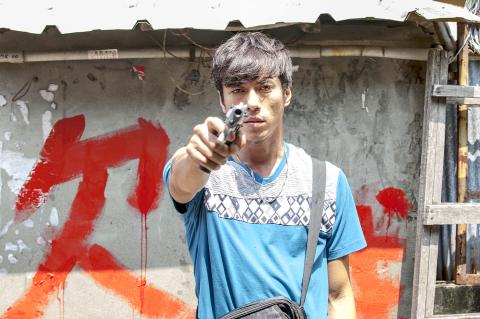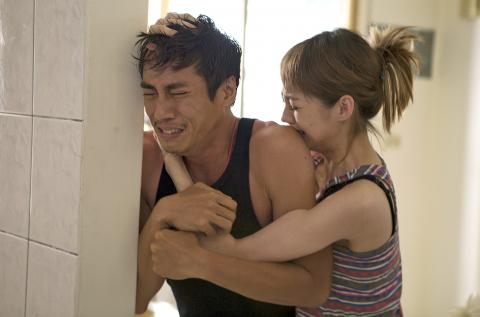Maverick (菜鳥) is the second part of acclaimed director Cheng Wen-tang’s (鄭文堂) trilogy that addresses transitional justice. The issue of abuse of power takes center stage again, finely delivered and continuing from Tears (眼淚), the first installment that offered a sober, rueful portrait of a veteran police officer haunted by his past. This time around, the police drama is made with a nod to audience-friendly storytelling and a more optimistic ending.
The film opens with Yeh (You Sheng, 宥勝) assigned to raid a gambling den run by the mob on his first day of work at a police station in Taichung. What Yeh and his colleagues encounter, however, are more than just a few gamblers and mobsters. Inside a suite at the illegal casino, Monkey (Huang Teng-hui, 黃鐙輝), the son of the Taichung city council speaker, played by Yang Lie (楊烈), is found too doped up to notice what is happening, lying beside an equally intoxicated senior police officer.
The next day, the speaker’s lackeys pay a visit to the police station, demanding Yeh stay away from the gambling operation. Disillusioned, Yeh soon realizes that the politician controls the police and criminal gangs. The rookie is also disappointed to learn that Brother Ming (Kaiser Chuang, 莊凱勛), a role model he looked up to when studying at the police academy, has gone along with others after years of working in the corrupt environment.

Photo courtesy of Dreamosa Film
However, Yeh begins to investigate Monkey’s illicit business, and finds out that the speaker’s crooked son is behind drug trafficking in local high schools and responsible for battering a student into a coma. As Yeh probes deeper, it becomes clear that the speaker will protect his son and his own interests at any cost.
In a parallel plotline, Brother Ming does everything he can to help his girlfriend Ann (Jian Man-shu, 簡嫚書), who works at a hostess club in order to pay off the massive debt her younger brother owes to the loan sharks.
Money, power and politics form the new trinity in Cheng’s work, in which the sense of right and wrong is blurred. While Tears focuses more on the past, in which state violence is manifested through Tsai Chen-nan’s (蔡振南) character, who used to torture his victims and lives in a vicious circle of never-ending remorse, Maverick deals with the present, bringing new hopes and optimism through the character of the young police officer who is free to make a moral choice not to collude with the corrupt system.

Photo courtesy of Dreamosa Film
The film also marks Cheng’s rare experiment with genre, spiced up with romance, crimes and drug abuse. Even though the director’s attempt at mainstream filmmaking is sometimes uneven and messy, a sense of guarded realism is always present, keeping the story and its characters rooted in life.
The film owes much of its success to its cast, including Yang and Yu An-shu (游安順), both of whom emanate grounded presence. You Sheng, one of the film’s leads, commands enough innocence and candor needed for his role as the untainted rookie cop. Yet Chuang, a professionally-trained stage actor, steals the movie with a role that is a mixture of anguish and passion. His romantic scenes with Jian are among the most intense and heartfelt seen in Taiwanese productions in recent years.
Fortunately, the actors’ admirable rendering doesn’t pass unnoticed. For her deeply felt performance as a damaged yet strong young woman in Maverick, Jian is nominated for best supporting actress at this year’s Golden Horse Awards (金馬獎), set to take place next Saturday.
Film notes
Maverick (菜鳥)
Directed by: Cheng Wen-tang (鄭文堂)
Starring: You Sheng (宥勝) as Yeh, Kaiser Chuang (莊凱勛) as Brother Ming, Jian Man-shu (簡嫚書) as Ann, Gin Oy (歐陽靖) as Hui Min
Language: in Mandarin and Hoklo with Chinese and English subtitles
Running time: 118 minutes
Taiwan release: Today

Taiwan has next to no political engagement in Myanmar, either with the ruling military junta nor the dozens of armed groups who’ve in the last five years taken over around two-thirds of the nation’s territory in a sprawling, patchwork civil war. But early last month, the leader of one relatively minor Burmese revolutionary faction, General Nerdah Bomya, who is also an alleged war criminal, made a low key visit to Taipei, where he met with a member of President William Lai’s (賴清德) staff, a retired Taiwanese military official and several academics. “I feel like Taiwan is a good example of

March 2 to March 8 Gunfire rang out along the shore of the frontline island of Lieyu (烈嶼) on a foggy afternoon on March 7, 1987. By the time it was over, about 20 unarmed Vietnamese refugees — men, women, elderly and children — were dead. They were hastily buried, followed by decades of silence. Months later, opposition politicians and journalists tried to uncover what had happened, but conflicting accounts only deepened the confusion. One version suggested that government troops had mistakenly killed their own operatives attempting to return home from Vietnam. The military maintained that the

Before the last section of the round-the-island railway was electrified, one old blue train still chugged back and forth between Pingtung County’s Fangliao (枋寮) and Taitung (台東) stations once a day. It was so slow, was so hot (it had no air conditioning) and covered such a short distance, that the low fare still failed to attract many riders. This relic of the past was finally retired when the South Link Line was fully electrified on Dec. 23, 2020. A wave of nostalgia surrounded the termination of the Ordinary Train service, as these train carriages had been in use for decades

Lori Sepich smoked for years and sometimes skipped taking her blood pressure medicine. But she never thought she’d have a heart attack. The possibility “just wasn’t registering with me,” said the 64-year-old from Memphis, Tennessee, who suffered two of them 13 years apart. She’s far from alone. More than 60 million women in the US live with cardiovascular disease, which includes heart disease as well as stroke, heart failure and atrial fibrillation. And despite the myth that heart attacks mostly strike men, women are vulnerable too. Overall in the US, 1 in 5 women dies of cardiovascular disease each year, 37,000 of them